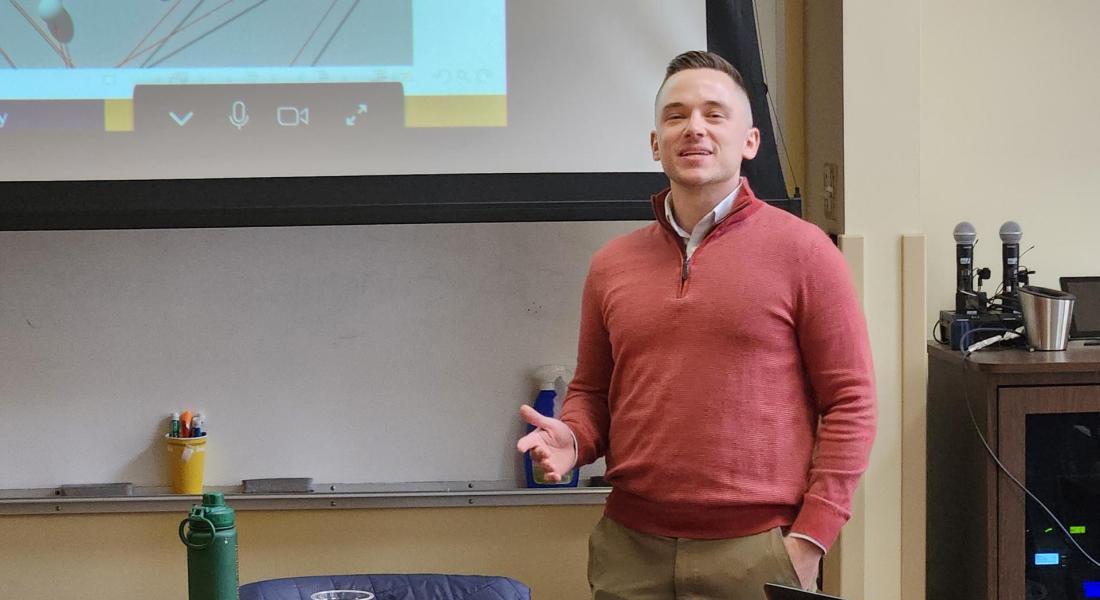
On April 15, the Kellogg Institute for International Studies at the University of Notre Dame hosted a book launch to introduce Cooperative Complexity: The Next Level of Global Economic Governance (Cambridge University Press, 2025) by Kellogg faculty fellow Richard Clark.
Cosponsored by Notre Dame International Security Center and the Department of Political Science, the event included an overview of the text by the author, followed by commentary from distinguished discussants Stephen C. Nelson, associate professor of political science at Northwestern University, and Erin Graham, associate professor of global affairs at Notre Dame and a Kellogg faculty fellow. It concluded with an audience Q&A.
Cooperative Complexity examines the evolution of international economic governance in the 21st century, focusing on the growing trend of international organizations (IOs) collaborating through joint programs and resource-sharing. While 20th-century governance centered on individual IOs, Clark highlights a shift toward cooperative arrangements where institutions like development banks and emergency lenders pool expertise and funding to mutually enforce policies in member states. This cooperation, driven by geopolitical alignment among major shareholder states, prioritizes political efficiency – enabling aligned IOs to amplify their influence – but often sacrifices economic efficiency, leading to suboptimal outcomes for recipient countries.
The book combines theoretical models with quantitative analysis, case studies, elite interviews, and experiments to demonstrate how geopolitical interests shape IO collaboration. For instance, Clark analyzes IMF-EU co-financing during Greece’s debt crisis to illustrate how collaboration reinforces power dynamics among dominant states while generating bureaucratic frictions that can obstruct program performance. By dissecting the networks connecting financial institutions, Clark argues that understanding these cooperative mechanisms is crucial for assessing the future of global governance, particularly in addressing challenges like climate change and economic inequality.
Nelson heaped praise on Cooperative Complexity, predicting it to be a “foundational anchor” for successful research programs, dissertations, articles, and books to come. He said it challenges long-standing assumptions of international relations research, shifting the focus away from interstate cooperation to interactions between international organizations. He noted that he would like to have seen Clark more deeply explore the concept of “efficiency” in the book. He also noted that factors beyond bureaucratic friction often contribute to underperformance in some inter-organizational work. Nelson cited the dysfunctional Greek case with the IMF and EU outlined in Clark’s book, discussing examples of grossly inaccurate macroeconomic forecasting as partially responsible for those failures. He concluded by saying that watching the future of IO functioning unfold will be a great test of Clark’s predictions in the book, especially given the recent economic and political uncertainty in the United States.
Graham also lauded Cooperative Complexity, recommending it wholeheartedly and offering praise for how it theorizes the member state and international organization sides of inter-organizational cooperation, its discussion of regime complexity, its mixed method approach, and its “masterful” literature review, among others. Noting that co-financing has not been studied systematically, she emphasized Clark’s contribution to the field. Graham expressed some questions about “the IO staff side of the equation,” wondering whether his organizational culture and interests arguments would stand up in practice. She also expressed curiosity about expectations of co-financing in institutions where there is not a clear lead state, citing climate finance with the Green Climate Fund as an example. Like Nelson, Graham concluded her remarks looking at the current state of the US and the uncertainty of its future geopolitical alignment, wondering how Clark would see patterns of cooperation in a potentially radical new context.
“It’s nice to have this opportunity to publicly congratulate you,” said Graham. “The book is wonderful.”
Richard Clark is assistant professor of political science specializing in international cooperation and political economy. His research and teaching interests include globalization, international finance, and climate change.
Cooperative Complexity: The Next Level of Global Economic Governance is available through Cambridge University Press and retail book sellers.





